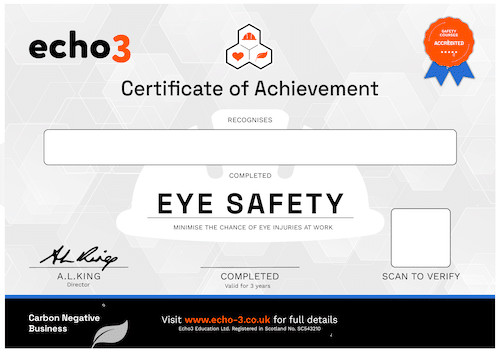Eye Safety Course
This online Eye Safety course looks at the basics of eye safety and why it is important.
This training helps staff understand the necessity of constant diligence and compliance with workplace eye safety best practice.
Around reportable 500 eye injuries occur each year in the UK. Up to 20% of which are disabling because of temporary or permanent vision loss. Three out of every five workers who suffered an eye injury wore no eye protection at the time of accident.
Many of these injuries are easily preventable by staff simply wearing the correct eye protection.
This online course emphasises the importance using eye protection at work.
Course Content
UNIT 1 | EYE PROTECTION
Firstly, we explore the primary causes of eye injuries in the workplace. And best-practice for contributing to a safe workplace.
UNIT 2 | TREATING EYE INJURIES
Secondly, we outline basic first aid for what to do if eye injuries occur.
Eye Safety Certificate

At the end of the online Eye Safety training course there is a 10 question, multiple choice quiz. If the learner demonstrates their understanding of the course content by achieving a minimum score of 80%, we’ll email them their completion certificate.
If learners score less than 80% they can revisit any part of the course and retake the quiz until they are successful. A posted certificate is available for £9.
Who should take this Eye Safety course?
All employees who are exposed to hazards that have the potential to cause an eye injury will benefit from this course.
For example:
- Construction workers
- Laboratory workers
- Technical skilled trades
- Warehouse workers
What are the learning outcomes?
On completion of this online Eye Safety training learners will know:
- Factors that contribute to eye injuries
- What causes eye injuries at work
- Where do injuries happen most often
- How eye injuries can be prevented
What are the course objectives?
- Reduce the chance of eye injuries at work. By providing best-practice guidance,
- Help employers provide appropriate training to staff
How to prevent eye injuries at work?
Three out of every five workers who suffered an eye injury wore no eye protection at the time of accident. And, of those who did, 40% wore the wrong type.
So, it’s important that employers provide the correct eye protection to employees and those employees know how to use them correctly.
Activities that require eye protection should be identified by employers as part of the Risk Assessment process.
What are the laws around eye safety?
There are 3 main laws and regulations, outlining what employers must do to keep employees safe from eye injuries in the workplace.
Namely the Health and Safety at Work Act (1974), the Management of Health and Safety at Work Regulations (1999). and the Personal Protective Equipment Regulations (2002).
What causes eye injuries at work?
Potential hazards at workplace that could cause eye injuries mostly include flying particles, molten metal, liquid chemicals, acids or caustic liquids, chemical gases or vapours, potentially infected material, or potentially harmful light radiation.
According to statistics, almost 70% of accidents result from flying or falling objects or sparks striking the eye.
It is estimated that nearly three-fifths of the objects are smaller than a pin head.
Contact with chemicals, splashed liquids or flying chemical particles causes 20% of eye injuries.
Other accidents are caused by objects swinging from a fixed or attached position, like tree limbs, ropes, chains, or tools which are pulled into the eye.
Failure to wear eye protection is the key factor in most eye injuries.







